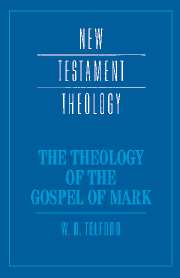3 - Mark and the New Testament
Published online by Cambridge University Press: 05 June 2012
Summary
MARK AND PAUL
I have completed my historical profile of the theology of the Gospel of Mark and it is now my task to relate that theology to the rest of the New Testament. Mark's Gospel and the Pauline Epistles are the earliest extant writings of early Christianity that we possess. It is fitting therefore that I should begin by commenting on the relationship between Mark and Paul. The question has entered into our enquiry at a number of points hitherto, and a positive connection between the two has in fact been one of the conclusions towards which I have leaned. It is time, therefore, to give more systematic attention to it.
There are clearly a number of affinities between Mark and Paul, a state of affairs which intriguingly (but no doubt co-incidentally) mirrors the external tradition that connects the apostle with the John Mark of the New Testament. Both exhibit a tension with the Jerusalem church. Paul, in a number of (admittedly disputed) passages, can barely disguise his impatience with these ‘pillars’ of the establishment (e.g. Gal. 2.6ff, 11–12; 2 Cor. 11.4–6, 22–3; 12.11), and, not averse to calling down a curse on anyone preaching a different gospel (Gal. 1.8–9), accuses Peter as one who ‘stood condemned’ (Gal. 2.11).
- Type
- Chapter
- Information
- The Theology of the Gospel of Mark , pp. 164 - 213Publisher: Cambridge University PressPrint publication year: 1999
- 1
- Cited by

